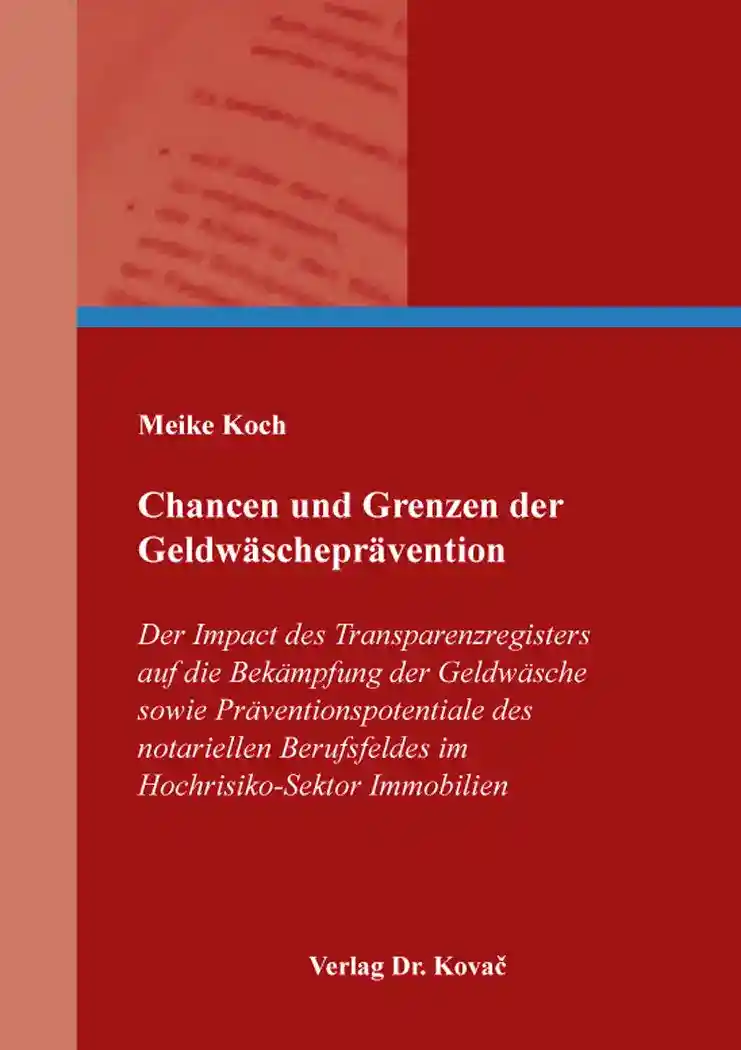Meike KochChancen und Grenzen der Geldwäscheprävention
Der Impact des Transparenzregisters auf die Bekämpfung der Geldwäsche sowie Präventionspotentiale des notariellen Berufsfeldes im Hochrisiko-Sektor Immobilien
Hamburg 2023, 384 pages
ISBN 978-3-339-13610-7 (print) |ISBN 978-3-339-13611-4 (eBook)
About this book deutschenglish
Already in 2018/19, the so-called First National Risk Analysis revealed that Germany must be assumed to be at medium to high risk of money laundering. The German real estate market, which is in the focus of the dissertation, is considered to be an area of "outstanding risk" in particular due to its attractiveness for foreign investors in combination with money laundering awareness that is probably still in need of optimisation.
Many forms of money laundering, especially in the high-risk real estate sector, make use of so-called "straw men" with the aim of keeping the true beneficial owner hidden. To counter this market-relevant information asymmetry, a transparency register was introduced in Germany in 2017 on the basis of EU Directive 2015/849.
This dissertation focuses two essential components in the fight against money laundering in the high-risk sector of real estate trading: the disclosure of the beneficial owners of associations and legal structures within the scope of §§ 20 and 21 GwG through the transparency register and the preventive potential of the professional group of notaries. Questioning the impact of the transparency register on the fight against money laundering, the dissertation is based on a demanding field of work in economic criminology and economic criminal law. Taking into account current and foreseeable developments, the conceptual functions of the transparency register as well as its practical reality are examined. Based on that, the opportunities and limitations of the register for effectively combatting money laundering are highlighted. Due to the special suitability of the real estate sector for splitting up legal and beneficial ownership, the author provides a link to the professional field of notaries, who are inevitably involved in real estate transactions due to their notarising function and who are thought to have considerable preventive potential, for example by fulfilling due diligence and reporting obligations under money laundering law. Concerning this, the author examines the legal basis of the notarial contribution to the prevention of money laundering as well as practical aspects. A striking point is the coexistence of money laundering law and professional law. Both are relevant in the notarial business. However, there are indications of collisions in relevant areas. Therefore the author raises a claim to create an appropriate balance between professional obligations on the one hand and the requirements of effectively combatting money laundering on the other hand.
Keywords
GeldwäscheGeldwäschebekämpfungGeldwäschepräventionGesellschaftstransparenzImmobiliensektorNicht-FinanzsektorNotareTransparenzTransparenzregisterWirtschaftlich BerechtigteWirtschaftskriminologieWirtschaftsstrafrechtIhr Werk im Verlag Dr. Kovač

Möchten Sie Ihre wissenschaftliche Arbeit publizieren? Erfahren Sie mehr über unsere günstigen Konditionen und unseren Service für Autorinnen und Autoren.
